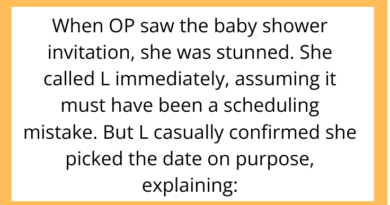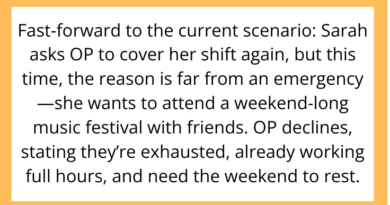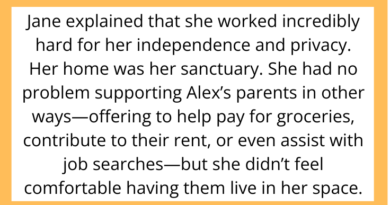AITAH for Not Letting My Mother-In-Law Hold My Newborn at the Hospital?
Welcoming a new baby should be a time of joy, bonding, and healing—but for one Reddit user, it quickly turned into a family feud. In a now-viral r/AITAH post, a new mother asked if she was in the wrong for refusing to let her mother-in-law (MIL) hold her newborn right after delivery.
Her decision sparked outrage from extended family, created tension with her partner, and left her wondering: Was she being too protective, or just setting necessary boundaries?
Let’s dive into the heart of this emotional situation and unpack the perspectives, family dynamics, and larger debate around boundaries, respect, and new motherhood.
The Scenario: Birth, Boundaries, and Hurt Feelings

According to the original poster (OP), she had just given birth after an exhausting labor and wanted the first hours to be spent quietly bonding with her baby, husband, and medical team. She’d clearly communicated before delivery that no visitors were allowed until she felt ready.
Her husband initially supported this plan, but when the baby arrived, his mother showed up uninvited to the hospital. OP was exhausted, overwhelmed, and upset—but still stuck to her boundary and refused to let her MIL enter the room or hold the baby.
The fallout was instant:
-
Her husband felt caught in the middle.
-
Her MIL was offended and hurt.
-
Other family members called OP controlling and dramatic.
But was OP truly out of line for prioritizing her postpartum peace?
Why Postpartum Boundaries Matter

Childbirth is a deeply physical and emotional experience. Recovery isn’t just about healing a body—it’s about adjusting to an entirely new identity as a parent. That’s why many new mothers choose to set strict boundaries after birth.
Here’s why that’s important:
-
Physical recovery: After labor, the body needs rest and time—having visitors can add stress or anxiety.
-
Mental health: Hormonal changes and sleep deprivation make emotional regulation harder.
-
Bonding time: Experts recommend skin-to-skin contact and uninterrupted bonding with the newborn.
Setting boundaries isn’t about excluding people—it’s about protecting the moment.
The MIL’s Perspective: Hurt or Entitled?

On the flip side, the MIL believed she was being unfairly shut out of a once-in-a-lifetime experience. She’d raised her own children, and now wanted to welcome her grandchild with love.
To her, the refusal to even hold the baby felt like a personal rejection. She might have seen it as:
-
A lack of trust.
-
A shift in her role in the family.
-
A sign of disrespect.
These feelings are valid, but they don’t override a new mother’s needs.
Should Partners Always Side With the Parent?

One major point of conflict in the Reddit thread was the husband’s reaction. Some believed he should’ve enforced his wife’s wishes more firmly, while others sympathized with his discomfort being caught between two important women in his life.
In truth, childbirth is not a moment for neutrality. A supportive partner should:
-
Uphold agreed-upon boundaries.
-
Protect the birthing person’s space and comfort.
-
Communicate clearly with family members to avoid conflict.
While it’s natural to want to avoid tension, the immediate postpartum period is not the time to negotiate boundaries.
The Internet Weighs In

The r/AITAH community overwhelmingly backed OP. Many users shared their own stories of postpartum boundary violations and how damaging they can be.
Others offered advice:
-
Set visitor expectations early.
-
Assign the partner the role of “boundary enforcer.”
-
Be unapologetic when protecting your health and peace.
That said, a few commenters noted that gently involving family in small, meaningful ways—like video calls or planned visits—can help prevent permanent rifts.
Final Thoughts: Respecting New Mothers Means Honoring Their Choices

Refusing to let someone hold your baby—especially during the fragile hours after birth—does not make you cruel or selfish. It makes you human.
In this situation, OP did what she believed was right for her body, mind, and child. And while her MIL’s feelings matter, they don’t come before the mother’s physical recovery and emotional safety.



